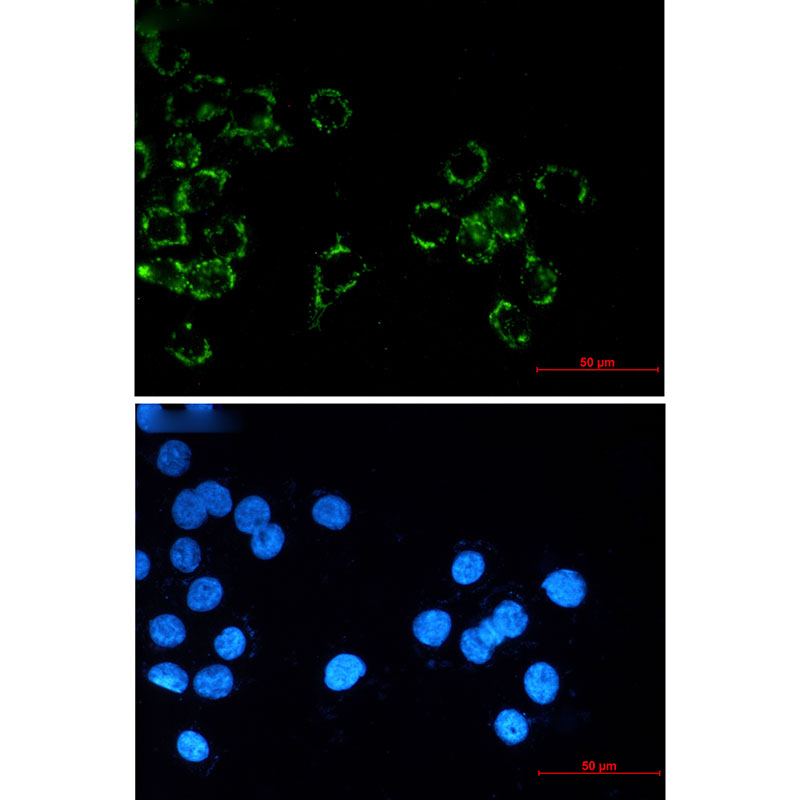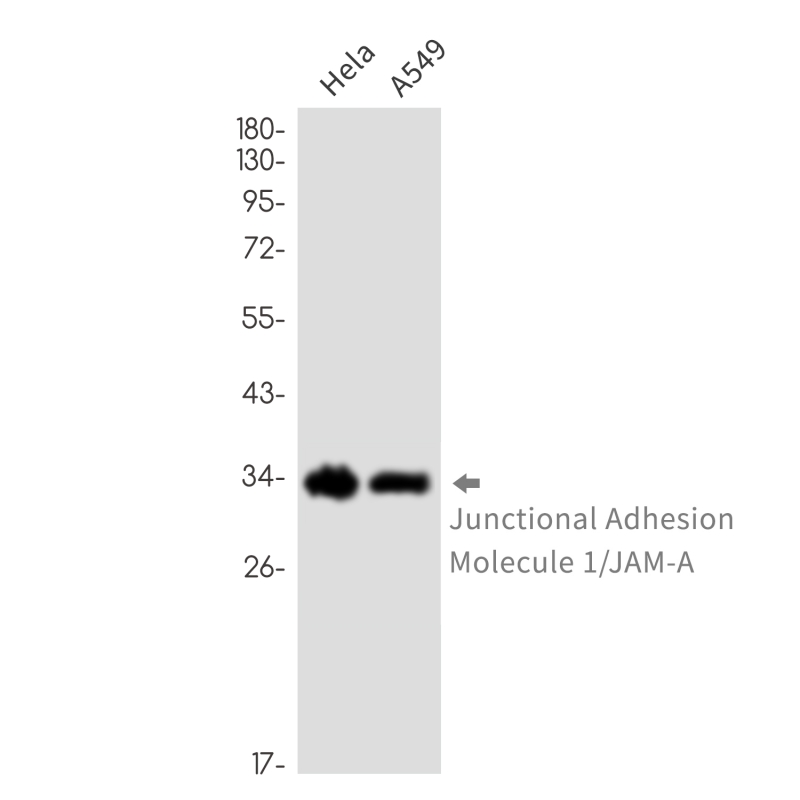

| WB | 1/500-1/1000 | Human,Mouse,Rat |
| IF | 1/20 | Human,Mouse,Rat |
| IHC | 咨询技术 | Human,Mouse,Rat |
| ICC | 1/50-1/200 | Human,Mouse,Rat |
| FCM | 咨询技术 | Human,Mouse,Rat |
| Elisa | 咨询技术 | Human,Mouse,Rat |
| Aliases | F11R; JAM1; JCAM; Junctional adhesion molecule A; JAM-A; Junctional adhesion molecule 1; JAM-1; Platelet F11 receptor; Platelet adhesion molecule 1; PAM-1; CD321 |
| Entrez GeneID | 50848 |
| WB Predicted band size | Calculated MW: 33 kDa; Observed MW: 33 kDa |
| Host/Isotype | Rabbit IgG |
| Antibody Type | Primary antibody |
| Storage | Store at 4°C short term. Aliquot and store at -20°C long term. Avoid freeze/thaw cycles. |
| Species Reactivity | Human |
| Immunogen | Recombinant protein of human Junctional Adhesion Molecule 1/JAM-A |
| Formulation | Purified antibody in TBS with 0.05% sodium azide,0.05%BSA and 50% glycerol. |
+ +
以下是关于Junctional Adhesion Molecule 1(JAM-1)抗体的3篇代表性文献及其摘要概括:
---
1. **标题**:JAM-1 regulates cell migration and neutrophil recruitment in inflammation
**作者**:Liu Y, et al.
**摘要**:该研究利用JAM-1特异性单克隆抗体,证明其通过阻断JAM-1与白细胞表面配体的相互作用,显著抑制中性粒细胞向炎症部位的迁移,提示JAM-1在炎症反应中的关键作用。
---
2. **标题**:Role of JAM-A in epithelial barrier dysfunction and cancer metastasis
**作者**:Naik MU, et al.
**摘要**:通过抗JAM-A抗体处理,研究发现JAM-1通过调控上皮-间质转化(EMT)促进肿瘤细胞侵袭,抗体阻断可显著降低体内转移,表明其作为癌症治疗靶点的潜力。
---
3. **标题**:JAM family proteins in tight junction dynamics and leukocyte trafficking
**作者**:Ebnet K, et al.
**摘要**:综述总结了JAM-1在细胞紧密连接形成和免疫细胞迁移中的作用,强调其抗体在实验模型中用于解析细胞间信号传导及开发抗炎疗法的应用。
---
如需具体文献来源(期刊、年份),可进一步补充说明。
Junctional Adhesion Molecule 1 (JAM-1), also known as F11 receptor or JAM-A, is a transmembrane glycoprotein belonging to the immunoglobulin superfamily. Predominantly localized at tight junctions of epithelial and endothelial cells, JAM-1 plays critical roles in maintaining cell polarity, regulating paracellular permeability, and mediating leukocyte transmigration during inflammation. Its extracellular domain features two immunoglobulin-like folds that facilitate homophilic interactions with adjacent JAM-1 molecules or heterophilic binding to integrins like LFA-1 (αLβ2).
Antibodies targeting JAM-1 are essential tools for studying cell-cell adhesion dynamics, barrier function, and inflammatory responses. In research, these antibodies are widely used in techniques such as immunofluorescence, flow cytometry, and Western blotting to visualize JAM-1 expression patterns or disrupt its function in experimental models. Dysregulation of JAM-1 has been implicated in pathological conditions, including cancer metastasis, atherosclerosis, and autoimmune disorders, making its antibodies valuable for mechanistic investigations.
Therapeutic applications are also being explored, as anti-JAM-1 antibodies may modulate leukocyte infiltration in inflammatory diseases or enhance endothelial barrier integrity in sepsis. However, their clinical utility requires careful evaluation due to JAM-1's dual roles in both physiological homeostasis and disease progression. Ongoing studies aim to refine antibody specificity and optimize therapeutic strategies targeting JAM-1 pathways.
×